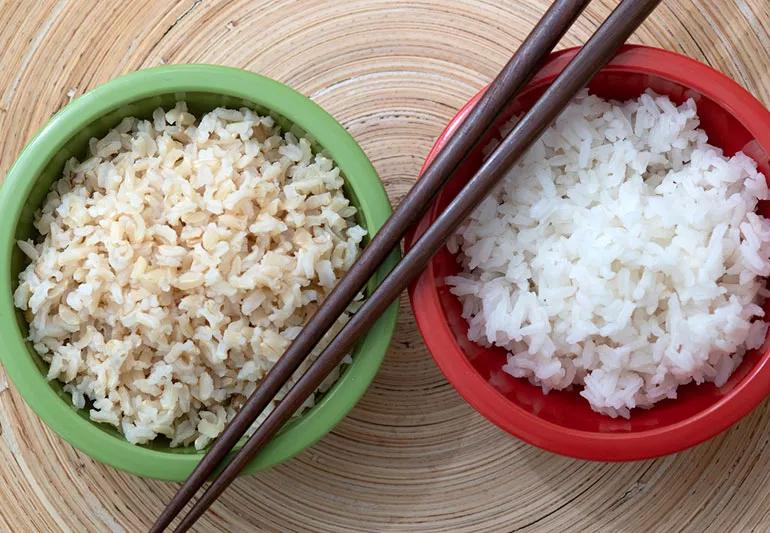The answer is clear, but there are factors to consider

Which is healthier: Brown rice or white rice? A nutritional tale of the tape provides a clear winner by knockout. “Hands down, brown rice brings more to the table,” says registered dietitian Beth Czerwony, RD.
Advertisement
Cleveland Clinic is a non-profit academic medical center. Advertising on our site helps support our mission. We do not endorse non-Cleveland Clinic products or services. Policy
But brown rice might not always be your best choice depending on some personal health factors. (Nothing is ever 100%, right?)
So let’s break it down with Czerwony in a little Rice 101.
Approximately 20% of the world’s calorie intake is connected to the humble rice grain, making it one of the most important foods on the planet. More than 3.5 billion people rely on rice as a daily staple of their diet.
To feed that need, farmers grow more than 100,000 different varieties of rice in a rainbow of colors. Thankfully, though, your mealtime choice typically gets narrowed down to a pair of options: brown or white.
Out of the two, white rice is far and away the most common to find on your plate – largely due to ease of cooking, a longer pantry shelf life and a neutral flavor profile that meshes well with other ingredients.
Whole grains such as rice can be broken down into three main parts – the germ, bran and endosperm. Each component packs different minerals, vitamins and proteins that offer you varying nutritional value.
Brown rice contains all three parts, making it a whole grain. White rice? Not so much, says Czerwony. Processing strips white rice of the germ and bran, leaving the starchy (and least nutritious) endosperm center.
Advertisement
Manufacturers do enrich white rice to replace some of what’s lost during processing. “Basically, they strip it down and try to redress it,” explains Czerwony. “But the final product still falls short of the nutritional level where it began.”
Don’t let the small size of a grain of rice fool you. Inside that little husk resides nutrients with the power to reduce your cholesterol levels and lower your risk of heart disease, stroke and diabetes.
Brown rice outpaces white rice in:
It’s a complex carbohydrate, too, which can help you manage your cholesterol and lose weight. “Brown rice will also keep you feeling full longer, which helps when you’re watching how much you eat,” says Czerwony.
There is one negative on the ledger for brown rice: arsenic. Brown rice contains elevated levels of the naturally occurring toxic element, which is present in many foods. It’s not enough to cause harm in a typical diet. But if you're pregnant, you may want to limit consumption.
The short answer is no… at least when eaten in moderation. “Is it the best food for you? No,” says Czerwony. “But it’s not going to hurt you.”
Enriched white rice serves as a good source of folic acid, which is recommended for pregnancy to help encourage healthy fetal development. It’s also recommended if you're breastfeeding. (Arsenic is not as present in white rice after processing.)
White rice also may be preferable if you’re on a low-fiber diet or have a sensitive stomach.
But it’s not hard to find criticism of white rice – particularly regarding how it can make your blood sugar levels spike. Some researchers even equate a serving of white rice to eating pure table sugar.
Additionally, research shows that a diet heavy in white rice could increase your risk of developing diabetes. (Whole grain brown rice has the opposite effect.)
If you just can’t decide between brown rice and white rice, pick them both. Czerwony says she often advises people to mix the varieties. Cooking times vary for brown rice and white rice, which will require some in-the-kitchen adjustments.
She also encourages people to explore potential rice substitutes, such as quinoa, barley and ancient grains. These also can be blended with rice or served on their own. Countless recipes can be found online.
“It’s important to know there’s not just one option or a simple choice between brown rice and white rice,” says Czerwony. “Take advantage of the variety.”
Advertisement
And that, she says, may be the healthiest choice of all.
Advertisement

Sign up for our Health Essentials emails for expert guidance on nutrition, fitness, sleep, skin care and more.
Learn more about our editorial process.
Advertisement

The tropical fruit is a good source of antioxidants and vitamin C

High amounts of cholesterol and saturated fat in red meat may be linked to heart disease

The leaves and pods from this tree are rich in essential nutrients

This starchy root vegetable is a staple in many global cuisines — but it has to be prepared correctly, or it can cause serious concerns

These delicate green sprouts can give you an extra dose of vitamin K and other nutrients — but they’re not safe for everyone

Edamame, lentils and chicken breast are good sources of protein

Eating this root vegetable can help support your eye, heart and brain health

The flavorful herb is full of antioxidants that may help regulate blood sugar

Even small moments of time outdoors can help reduce stress, boost mood and restore a sense of calm

A correct prescription helps your eyes see clearly — but as natural changes occur, you may need stronger or different eyeglasses

Both are medical emergencies, but they are very distinct events with different causes